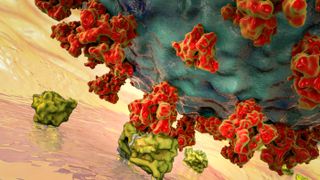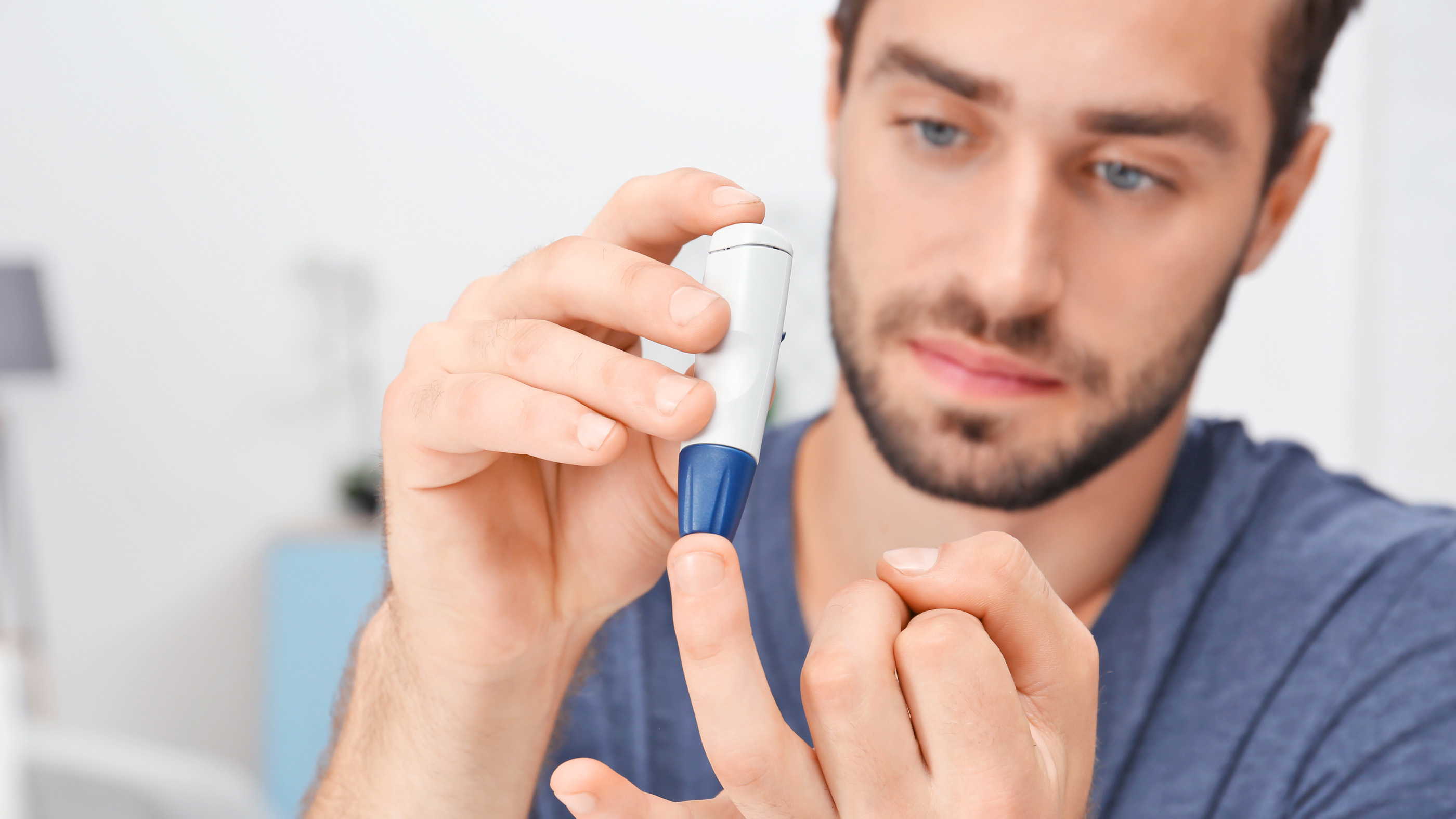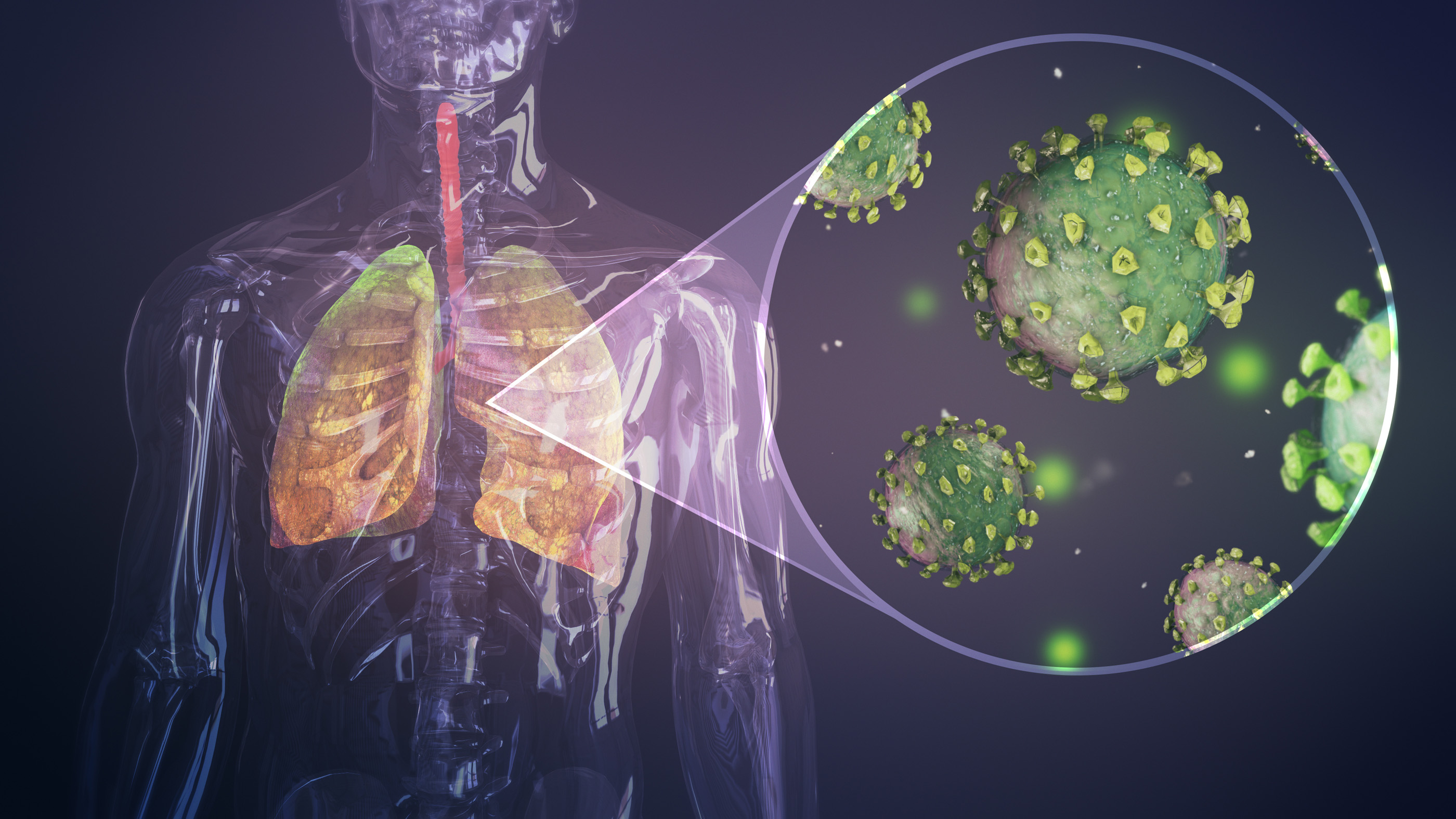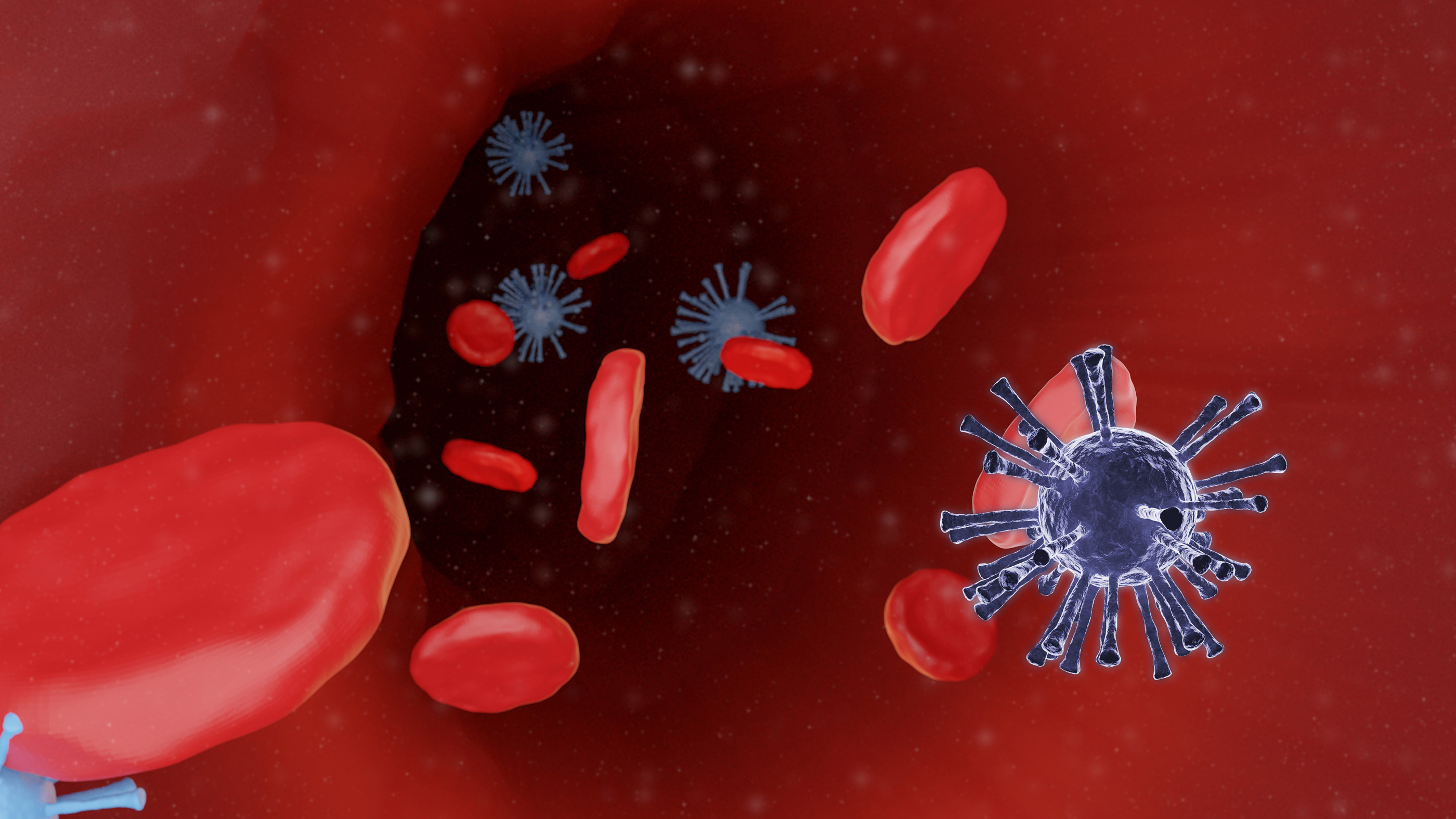When Searching for a Pattern in Fashion Fluctuations,
Why COVID-19 kills some people and spares others. Here'due south what scientists are finding.

The novel coronavirus causing COVID-nineteen seems to hit some people harder than others, with some people experiencing merely mild symptoms and others being hospitalized and requiring ventilation. Though scientists at first thought historic period was the dominant factor, with young people avoiding the worst outcomes, new research has revealed a suite of features impacting illness severity. These influences could explain why some perfectly healthy 20-yr-old with the disease is in dire straits, while an older seventy-year-old dodges the need for critical interventions.
Underlying health weather are thought to be an important factor influencing illness severity. Indeed, a study of more than 1.3 one thousand thousand COVID-19 cases in the U.s., published June 15 in the journal Morbidity and Mortality Weekly Report, found that rates of hospitalizations were half dozen times college and rates of decease were 12 times higher among COVID-19 patients with underlying conditions, compared with patients without underlying atmospheric condition. The nearly ordinarily reported underlying weather condition were center disease, diabetes and chronic lung disease.
In general, risk factors for more astringent COVID-xix outcomes include:
Historic period
Diabetes (type 1 and type 2)
Center disease and hypertension
Smoking
Blood type
Obesity
Genetic factors
Age
About 8 out of x deaths associated with COVID-19 in the U.Southward. take occurred in adults ages 65 and older, according to the U.S. Centers for Affliction Command and Prevention (CDC). The risk of dying from the infection, and the likelihood of requiring hospitalization or intensive medical care, increases significantly with age. For example, adults ages 65-84 make upward an estimated four-xi% of COVID-19 deaths in the U.S, while adults ages 85 and above make upwards 10-27%.
The trend may be due, in role, to the fact that many elderly people have chronic medical conditions, such equally heart disease and diabetes, that can exacerbate the symptoms of COVID-19, co-ordinate to the CDC. The ability of the immune system to fight off pathogens also declines with age, leaving elderly people vulnerable to severe viral infections, Stat News reported.
Related: Coronavirus in the US: Latest COVID-19 news and example counts
Diabetes

Diabetes mellitus — a grouping of diseases that result in harmful high blood sugar levels — likewise seems to be linked to risk of more severe COVID-19 infections.
The virtually common form in the U.S. is type 2 diabetes, which occurs when the body'south cells don't respond to the hormone insulin. As a result, the saccharide that would otherwise move from the bloodstream into cells to exist used as energy just builds upward in the bloodstream. (When the pancreas makes petty to no insulin in the first place, the condition is chosen blazon 1 diabetes.)
In a review of 13 relevant studies, scientists found that people with diabetes were almost 3.seven times more than likely to have a critical case of COVID-19 or to dice from the disease compared with COVID-xix patients without any underlying wellness conditions (including diabetes, hypertension, heart disease or respiratory affliction), they reported online Apr 23 in the Journal of Infection.
Even then, scientists don't know whether diabetes is directly increasing severity or whether other health weather condition that seem to tag along with diabetes, including cardiovascular and kidney conditions, are to blame.
That fits with what researchers have seen with other infections and diabetes. For instance, influenza and pneumonia are more than mutual and more serious in older individuals with type 2 diabetes, scientists reported online April 9 in the periodical Diabetes Research and Clinical Practice. In a literature search of relevant studies looking at the link between COVID-19 and diabetes, the authors of that paper plant a few possible mechanisms to explicate why a person with diabetes might fare worse when infected with COVID-19. These mechanisms include: "Chronic inflammation, increased coagulation activity, immune response harm and potential direct pancreatic damage by SARS-CoV-2."
Related: 13 coronavirus myths disrepair by science
Mounting research has shown the progression of type 2 diabetes is tied to changes in the body's immune organization. This link could as well play a function in poorer outcomes in a person with diabetes exposed to SARS-CoV-two, the virus that causes COVID-19.
No inquiry has looked at this particular virus and immune response in patients with diabetes; however, in a study published in 2018 in the Journal of Diabetes Enquiry, scientists establish through a review of past research that patients with obesity or diabetes showed immune systems that were out of whack, with an harm of white blood cells called Natural Killer (NK) cells and B cells, both of which help the trunk fight off infections. The research too showed that these patients had an increase in the production of inflammatory molecules chosen cytokines. When the immune system secretes also many cytokines,a and so-called "cytokine tempest" tin can erupt and harm the body's organs. Some research has suggested that cytokine storms may be responsible for causing serious complications in people with COVID-19, Live Science previously reported. Overall, type 2 diabetes has been linked with impairment of the very system in the body that helps to fight off infections like COVID-nineteen and could explain why a person with diabetes is at high take chances for a astringent infection.
Not all people with blazon ii diabetes are at the same run a risk, though: A written report published May one in the journal Cell Metabolism found that people with diabetes who keep their blood sugar levels in a tighter range were much less likely to have a severe disease course than those with more fluctuations in their blood sugar levels.
People with type ane diabetes (T1D) are also at elevated risk of adverse outcomes, a pocket-sized study published in Diabetes Care suggests. The study, coordinated by T1D Exchange — a nonprofit inquiry arrangement focused on therapies for those with type 1 diabetes — found that of 64 people with either COVID-19 or COVID-19-like symptoms, ii died. Nearly 4 in 10 people had to be treated in a hospital. And nearly a 3rd experienced diabetic ketoacidosis — a potentially deadly condition in which the torso experiences a shortage of insulin and blood carbohydrate levels rise dangerously high. The boilerplate patient was well-nigh 21 years old, suggesting that risks could exist potentially higher for older historic period groups.
Heart disease and hypertension

People with conditions that bear on the cardiovascular system, such as heart disease and hypertension, generally suffer worse complications from COVID-19 than those with no preexisting conditions, co-ordinate to the American Heart Association. That said, historically healthy people can besides suffer eye damage from the viral infection.
The first reported coronavirus decease in the U.Southward., for instance, occurred when the virus somehow damaged a woman'south centre muscle, eventually causing it to burst, Live Scientific discipline reported. The 57-twelvemonth-onetime maintained good health and exercised regularly before condign infected, and she reportedly had a good for you center of "normal size and weight." A study of COVID-nineteen patients in Wuhan, China, found that more ane in 5 patients developed heart damage — some of the sampled patients had existing eye conditions, and some did non.
In seeing these patterns emerge, scientists developed several theories as to why COVID-19 might hurt both damaged hearts and healthy ones, co-ordinate to a Live Scientific discipline report.
In ane scenario, past attacking the lungs directly, the virus might deplete the body's supply of oxygen to the point that the center must work harder to pump oxygenated blood through the body. The virus might also assail the centre directly, equally cardiac tissue contains angiotensin-converting enzyme 2 (ACE2) — a molecule that the virus plugs into to infect cells. In some individuals, COVID-nineteen tin as well kickstart an overblown immune response known as a cytokine storm, wherein the torso becomes severely inflamed and the eye could endure damage every bit a result.
Smoking

People who smoke cigarettes may be decumbent to severe COVID-19 infections, pregnant they face a heightened risk of developing pneumonia, suffering organ damage and requiring breathing support. A study of more than than 1,000 patients in China, published in the New England Journal of Medicine, illustrates this tendency: 12.three% of current smokers included in the study were admitted to an ICU, were placed on a ventilator or died, as compared with 4.vii% of nonsmokers.
Cigarette smoke might render the body vulnerable to the coronavirus in several ways, according to a recent Alive Science report. At baseline, smokers may be vulnerable to catching viral infections because smoke exposure dampens the immune system over fourth dimension, amercement tissues of the respiratory tract and triggers chronic inflammation. Smoking is likewise associated with a multitude of medical conditions, such as emphysema and atherosclerosis, which could exacerbate the symptoms of COVID-19.
A recent study, posted March 31 to the preprint database bioRxiv, proposed a more speculative caption equally to why COVID-nineteen hits smokers harder. The preliminary inquiry has non yet been peer-reviewed, only early interpretations of the data propose that smoke exposure increases the number of ACE2 receptors in the lungs — the receptor that SARS-CoV-ii plugs into to infect cells.
Many of the receptors appear on so-called goblet and club cells, which secrete a mucus-like fluid to protect respiratory tissues from pathogens, debris and toxins. It's well-established that these cells grow in number the longer a person smokes, but scientists don't know whether the subsequent boost in ACE2 receptors directly translates to worse COVID-19 symptoms. What's more than, it's unknown whether high ACE2 levels are relatively unique to smokers, or mutual among people with chronic lung conditions.
Obesity
Several early on studies have suggested a link between obesity and more severe COVID-19 disease in people. I written report, which analyzed a grouping of COVID-19 patients who were younger than the age of 60 in New York Metropolis, found that those who were obese were twice as likely as non-obese individuals to be hospitalized and were one.8 times as likely to exist admitted into critical care.
"This has important and practical implications" in a country like the U.South. where most forty% of adults are obese, the authors wrote in the study, which was accepted into the periodical Clinical Infectious Diseases but not yet peer-reviewed or published. Similarly, another preliminary report that hasn't yet been peer-reviewed found that the 2 biggest risk factors for beingness hospitalized from the coronavirus are historic period and obesity. This written report, published in medRxiv looked at data from thousands of COVID-19 patients in New York City, just studies from other cities around the globe found similar results, as reported by The New York Times.
A preliminary study from Shenzhen, China, which also hasn't been peer-reviewed, institute that obese COVID-xix patients were more than than twice as likely to develop astringent pneumonia as compared with patients who were normal weight, according to the report published as a preprint online in the journal The Lancet Infectious Diseases. Those who were overweight, but not obese, had an 86% college adventure of developing severe pneumonia than did people of "normal" weight, the authors reported. Another study, accepted into the journal Obesity and peer-reviewed, found that nearly half of 124 COVID-19 patients admitted to an intensive care unit in Lille, France, were obese.
It'due south not clear why obesity is linked to more than hospitalizations and more severe COVID-19 disease, but there are several possibilities, the authors wrote in the study. Obesity is mostly thought of as a take a chance gene for severe infection. For example, those who are obese had longer and more severe disease during the swine flu epidemic, the authors wrote. Obese patients might besides take reduced lung chapters or increased inflammation in the body. A greater number of inflammatory molecules circulating in the trunk might crusade harmful immune responses and atomic number 82 to severe disease.
Claret type

Blood type seems to be a predictor of how susceptible a person is to contracting SARS-CoV-2, though scientists haven't found a link between blood type per se and severity of affliction.
Jiao Zhao, of The Southern University of Science and Technology, Shenzhen, and colleagues looked at claret types of 2,173 patients with COVID-19 in three hospitals in Wuhan, Mainland china, as well as blood types of more than 23,000 non-COVID-19 individuals in Wuhan and Shenzhen. They constitute that individuals with blood types in the A grouping (A-positive, A-negative and AB-positive, AB-negative) were at a higher risk of contracting the disease compared with non-A-grouping types. People with O blood types (O-negative and O-positive) had a lower risk of getting the infection compared with not-O blood types, the scientists wrote in the preprint database medRxiv on March 27; the written report has still to be reviewed by peers in the field.
In a more than contempo study of blood type and COVID-19, published online April 11 to medRxiv, scientists looked at one,559 people tested for SARS-CoV-ii at New York Presbyterian hospital; of those, 682 tested positive. Individuals with A claret types (A-positive and A-negative) were 33% more likely to test positive than other blood types and both O-negative and O-positive blood types were less likely to test positive than other claret groups. (There's a 95% gamble that the increase in risk ranges from 7% to 67% more likely.) Though but 68 individuals with an AB blood type were included, the results showed this group was likewise less likely than others to test positive for COVID-19.
The researchers considered associations betwixt blood type and gamble factors for COVID-19, including age, sex activity, whether a person was overweight, other underlying health conditions such as diabetes mellitus, hypertension, pulmonary diseases and cardiovascular diseases. Some of these factors are linked to blood type, they found, with a link between diabetes and B and A-negative claret types, between overweight condition and O-positive blood groups, for case, among others. When they deemed for these links, the researchers yet found an association between claret blazon and COVID-19 susceptibility. When the researchers pooled their information with the enquiry by Zhao and colleagues out of Communist china, they found similar results as well as a pregnant driblet in positive COVID-nineteen cases among claret type B individuals.
Why blood type might increase or subtract a person'south risk of getting SARS-CoV-ii is not known. A person's blood type indicates what kind of certain antigens encompass the surfaces of their blood cells; These antigens produce certain antibodies to help fight off a pathogen. Past inquiry has suggested that at least in the SARS coronavirus (SARS-CoV), anti-A antibodies helped to inhibit the virus; that could be the same mechanism with SARS-CoV-2, helping blood group O individuals to go along out the virus, according to Zhao'south team.
Genetic factors

Many medical atmospheric condition can worsen the symptoms of COVID-nineteen, but why practise historically salubrious people sometimes fall dangerously ill or dice from the virus? Scientists suspect that certain genetic factors may leave some people especially susceptible to the disease, and many research groups aim to pinpoint exactly where those vulnerabilities prevarication in our genetic code.
In one scenario, the genes that instruct cells to build ACE2 receptors may differ between people who contract astringent infections and those who hardly develop any symptoms at all, Science magazine reported. Alternatively, differences may lie in genes that help rally the immune system against invasive pathogens, according to a recent Alive Science study.
For instance, a written report published April 17 in the Journal of Virology suggests that specific combinations of human leukocyte antigen (HLA) genes, which train immune cells to recognize germs, may be protective against SARS-CoV-2, while other combinations leave the body open up to attack. HLAs stand for only i cog in our immune system mechanism, though, so their relative influence over COVID-19 infection remains unclear. Additionally, the Journal of Virology study only used computer models to simulate HLA action against the coronavirus; clinical and genetic data from COVID-19 patients would exist needed to flesh out the function of HLAs in real-life immune responses.
- The 12 deadliest viruses on Globe
- 20 of the worst epidemics and pandemics in history
- xi (sometimes) deadly diseases that hopped across species
Originally published on Live Science .
0 Response to "When Searching for a Pattern in Fashion Fluctuations,"
Post a Comment